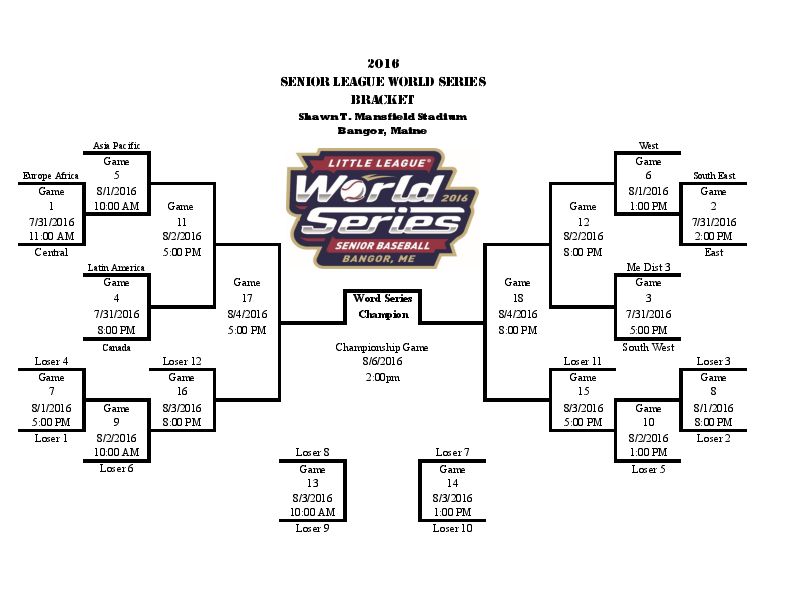News and Announcements
2016 11&12 Softball District Tournament
2016
Maine District Three Little League
District Tournament Brackets
2016 Senior League Baseball World Series Bracket

Learn About Arm Safety Through Little League and the Pitch Smart Program
After several years of research, Little League launched its pitch count program in 2006. With limits set for different amounts of pitches for different age groups, Little League has been diligent in protecting young arms since establishing strict pitching rules. With many baseball players participating in Little League and other youth baseball programs, it is important for parents and coaches to use the Pitch Smart campaign and the Little League pitch count program to ensure young pitching arms stay safe.
Little League strongly encourages all Little League volunteers, parents, and officials to review PitchSmart.org and share it with others.
Little League International has been identified as one of the only youth baseball organizations in full compliance of Major League Baseball and USA Baseball’s Pitch Smart compliance program. Read More about Full Compliance.
Little League has achieved its Full Compliance designation by:
- Following Pitch Smart guidelines pertaining to pitch counts and rest periods, which align with Little League regulations, across all competitions
- Recommending that players, parents and coaches adhere to all additional Pitch Smart guidelines
- Sharing general Pitch Smart information on our website
- Distributing Pitch Smart information all coaches through our ASAP and Coach's Box newsletters
- Including a Pitch Smart informational segment with details about pitch counts and rest periods, in formal coach's meetings, which typically occur as part of ASAP or local league operations
- Encouraging local leagues to share Pitch Smart information during team orientation meetings with parents and players
Support from the Stands
From its founding in 1939 to now, one of the goals of Little League® is to provide an outlet where kids can be kids while allowing them to learn, grow, and mature at their own pace with the gentle guidance of a volunteer coaching staff. For many parents, the Little League experience is the first time, outside of school, where their child experiences some level of individuality. Physically, there’s distance between the bleachers and the field. Players should have that same distance from an instruction standpoint. It’s important for kids to know that their parents are in the stands, but that presence should be of the supportive nature, cheering and complimenting, not coaching.
Coach from the Dugout
Let your child learn the game, and the other life lessons Little League provides, by allowing the coaches to handle player guidance and direction, as well as team maneuvering. Even if you think your daughter is playing too deep in center field, let the coaches make that call. They probably know better than you who is up to bat, and who has the ability to hit a sky-high fly. Even if you think your son should be playing even with third base, let the coaches call the positioning. Maybe the manager suspects a bunt. And, whatever you do, don’t contradict any of the direction from the dugout. If you hear the manager tell the infield to play back with bases loaded, no out, and down by two, don’t motion for your son or daughter at first to play up. Hearing one thing from the dugout, and something opposite from mom or dad in the bleachers will confuse your Little Leaguer®, and frustrate your team’s manager.
If you do disagree with your child’s manager, wait 24 hours until after the end of the game, and then contact the manager to discuss your thoughts. Or, consider volunteering and spending time at your child’s next practice to become more active in those game-time decisions.
At Little League games, coaches should do the coaching, and parents should do the parenting. Sit in the stands, and provide positive reinforcement and support. Often times, the playing field is a place where children can experience something they love without mom and dad by their side. Give them some space, and let them grow into themselves while they have a ton of fun with their friends.